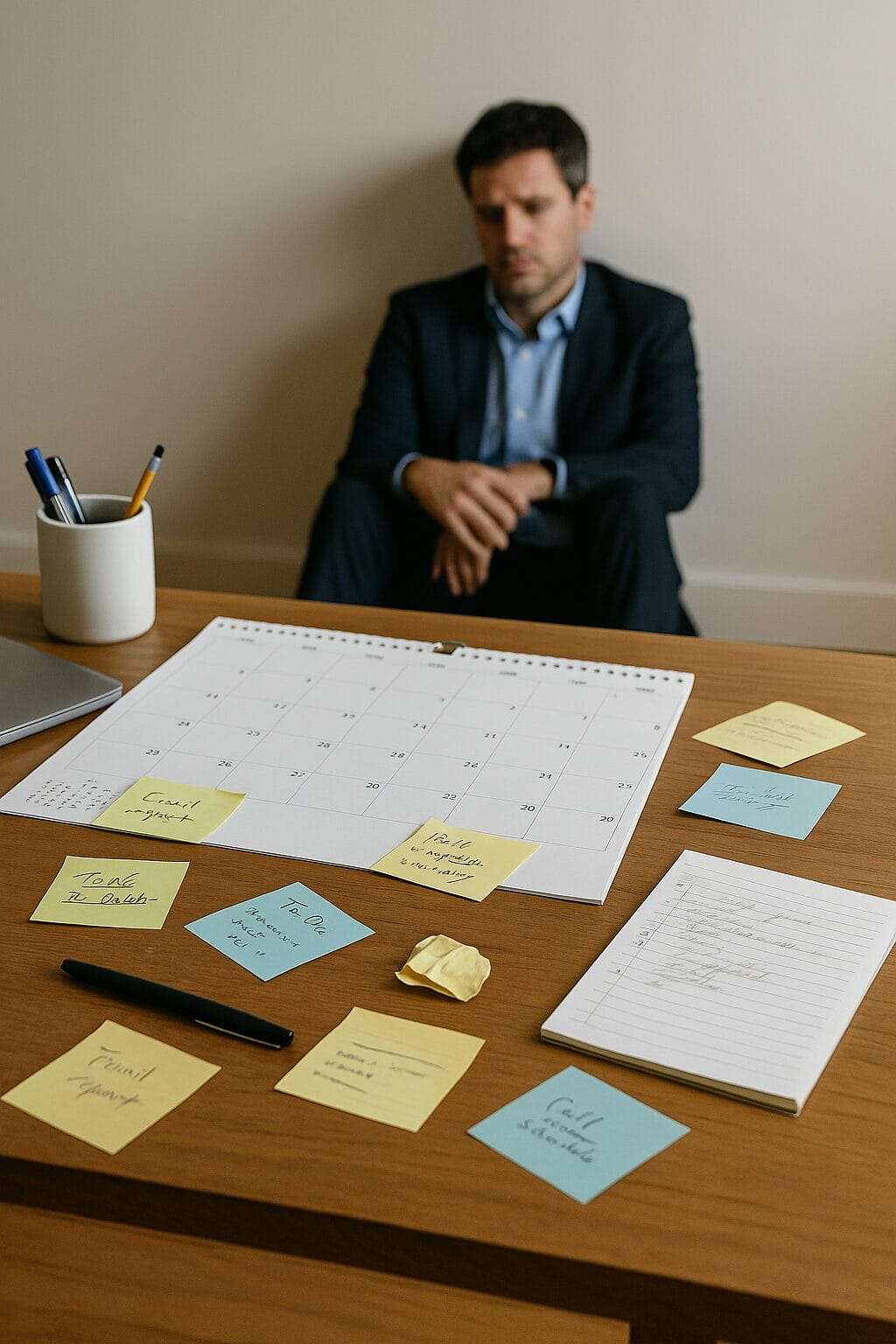- Updated: October 23, 2025
You’re the go-to person.
The one everyone counts on to stay calm, handle pressure, and never miss a deadline.
You’ve mastered the art of answering emails while disassociating—
and no one suspects a thing.
But the truth?
You’re one spreadsheet update away from a full-on meltdown.
And part of you understands Justin Bieber’s 2013 breakdown just as well as whatever he’s unraveling in 2025.
You’ve thought about getting visible hand tattoos—just to externalize what you can’t say out loud.
This post is for the high-performing, emotionally worn professional who’s not in crisis…
but isn’t okay either.
You’re not lazy. You’re not weak.
You’re carrying the weight of your history, your expectations, and everyone else’s needs—while still performing.
This isn’t a diagnosis.
It’s a permission slip.
You don’t need to collapse to deserve care.
Let’s start there.
The Emotional Freedom Path
🧠 The Hidden Cost of Keeping It Together
You’re Not a Mess—You’re a Master of Containment
High-functioning doesn’t mean healed.
It just means you’ve gotten really, really good at containing everything that might disrupt your image, your output, or your relationships.
You know how to smile while your nervous system is screaming.
You show up to Zoom calls with 4 hours of sleep and a stomach full of anxiety.
You over-deliver, over-analyze, overcompensate—and under-acknowledge the toll it takes.

On the outside? You’re organized. Efficient. “Impressive.”
On the inside? You’re tired of white-knuckling your way through another day.
But admitting that feels…dangerous. Like if you finally told someone how much you’re carrying, the whole thing might collapse.
That’s not failure.
That’s survival.
And you’ve been doing it alone for a long time.
But here’s what no one told you:
Emotional pain doesn’t stop just because you learned to perform over it.
It builds. It festers.
And eventually, it starts to whisper louder:
“You can’t keep going like this.”
This is that whisper.
Keep reading.
🔄 What You Internalized Isn’t the Truth
You’re Not Broken. You’re Burned by Expectation.
Somewhere along the way, you learned that holding it together was safer than being honest.
You became the reliable one.
The self-starter.
The friend who never needed help, the leader who always “had it under control.”

But beneath all that steadiness was a quiet equation forming:
Struggling = Weakness.
Needing help = Failure.
Feeling too much = Embarrassment.
So when you started checking out emotionally…
When you stopped enjoying the things that once energized you…
When your mood flatlined and your fuse shortened and your body stopped responding the way it used to…
You didn’t say anything.
The cost came high. So high that you learned to self-abandoning your needs and desires just to keep the appearance of stability and perfection.
Because in your mind, struggling meant something was wrong with you—not that something hurt you.
But here’s the truth:
You’re not emotionally defective.
You’ve just spent years suppressing your pain so you could be what everyone else needed.
You don’t need to be fixed.
You need to be witnessed.
You need to remember that internal chaos isn’t evidence of failure—it’s often evidence of unprocessed survival.
This isn’t the part where you “snap out of it.”
This is the part where you stop blaming yourself for being exhausted.
🕯️ Signs You’re Not “Just Tired”—You’re Hurt
You Thought It Was Normal. It’s Not.
You’ve brushed off the signs for years.
Told yourself this is just adulthood. Or burnout. Or what leadership looks like when you’re doing it right.
But let’s get honest.
You thought it was normal to:

Feel relieved when people cancel on you—because you didn’t have the energy to show up in the first place.
→ That’s not just introversion. That’s social withdrawal from emotional depletion.Start projects with fire, then ghost them with shame.
→ That’s not laziness. That’s executive dysfunction born from internal overload.Live in extremes—either hyper-productive or totally checked out.
→ That’s not a time management problem. That’s your nervous system swinging between fawn and freeze.Cling to your routines like a life raft…until you suddenly abandon everything.
→ That’s not flakiness. That’s emotional collapse from carrying too much for too long.Mentally rehearse the same conflict 20 times—but never actually say how you feel.
→ That’s not overthinking. That’s emotional suppression disguised as “being professional.”
These aren’t personality quirks.
They’re pain signals your system has learned to hide in plain sight.
And when everyone around you benefits from your performance, no one has a reason to ask if you’re okay.
But I will.
Are you okay?
Keep reading. Let’s talk about what healing actually looks like—without scrapping your whole life.
🧠 Start Here—Not With a 5-Year Plan
What Healing Actually Looks Like (When You’re Still Showing Up)
Let’s get one thing straight:
Healing doesn’t mean burning your life down and starting from scratch.
You don’t need to quit your job, move to the desert, or read 42 trauma books.
You just need to start interrupting the lie that you’re fine as long as you’re functioning.
Here’s what healing actually looks like when you’re high-performing and hurt:

🟡 1. You pause before you perform.
You notice that urge to overexplaining, overdelivering, or apologizing for existing—
…and you ask yourself: “Am I trying to prove I’m okay, or am I actually okay?”
👉 If your leadership feels more like silent endurance than real presence, you might be dealing with emotional castration.
Read this next: Reclaim Masculinity After Emotional Castration
🟡 2. You don’t answer immediately.
You give yourself 30 seconds, 30 minutes, or 30 hours before you respond to something emotionally loaded.
That’s not avoidance. That’s regulation.
🟡 3. You stop spiritualizing your burnout.
No more calling it “a season of stretching” when it’s actually chronic emotional depletion.
🟡 4. You let one safe person see you mid-flinch.
Not the polished version. Not the “I’ve got insight now” version.
The messy, in-process, “I don’t know what I need” version.
🟡 5. You allow rest to mean something besides collapse.
You take a breath before you break down.
That counts. That’s growth.
Healing isn’t about becoming unrecognizable.
It’s about finally recognizing yourself again—beneath all the coping.
And you don’t need to do it alone.
💬 You’re Not Alone—Even If It Feels That Way
You Deserve to Be Seen Without Performing
There’s a specific kind of loneliness that comes from being the strong one.
The one who knows better, the one who reads all the books, the one who leads everyone else through their mess.

And yet here you are—feeling like the version of you that shows up every day is just…a shell.
Let me say it clearly:
You’re not weak for being tired.
You’re not broken for needing help.
And you’re not alone in this.
You are allowed to fall apart without losing your value.
You are allowed to tell the truth before it becomes a crisis.
You are allowed to need—without apology.
If you’ve been quietly asking,
“Is anyone else feeling this way?”
Yes. They are.
And you’re not too late to start healing.
🤔 Not Sure What You’re Feeling? Start Here.
Q: I’m showing up and getting things done. Does that mean I’m okay?
Not necessarily. High-functioning people often perform well while falling apart internally. If your productivity feels numb, forced, or like a cover-up—it’s worth paying attention.
Related post:
👉🏾 Still Sober, Still Drowning (podcast)
Q: Is this burnout, or something deeper?
If rest doesn’t help and you feel disconnected from your own life, it’s likely deeper. Burnout fades with time off. Emotional collapse needs rebuilding, not just recovery.
Related post:
👉🏾 You’re Not Lazy—You’re Depressed. And There’s a Way Out
Q: Why does it feel embarrassing to even talk about this?
Because you were conditioned to survive through excellence. The moment you name your exhaustion, the illusion breaks—and that’s terrifying. But it’s also the first step toward peace.
Related post:
👉🏾 When Criticism Hits Deeper Than It Should
👉🏾 You’re Not Broken—You’re High-Functioning and Hurt (read this post again)
Q: How do I start healing if I don’t have time to fall apart?
You don’t have to fall apart. You just need to stop pretending you’re fine. Healing starts with tiny, honest moves—pauses, boundaries, regulation—not a complete life reset.
Related post:
👉🏾 Healing While Holding It Together (closing section of this post)
👉🏾 From Self-Doubt to Self-Trust
✨ Where This Leaves You: Healing While Holding It Together
You don’t have to blow up your life to earn a break.
You don’t need a new personality to begin healing.
You just need to stop abandoning yourself in the name of keeping it together.
Because here’s the truth:
You’re not here because you failed.
You’re here because something inside you finally said—“I can’t keep doing it like this.”
And that voice?
That’s not weakness.
That’s wisdom.
If you’re ready to stop performing and start healing—for real—I’d be honored to support you.
💛 Work with me, Denise G. Lee – Together, we’ll untangle the deeper patterns holding you back and create clear, practical strategies that match you. No hype. No formulas. Just honest, personalized support.
👉 Explore working together
🎙️ Want more real talk like this?
Listen to my podcast for unfiltered conversations on emotional growth, leadership, and the truth about healing in business and life.
👉 Introverted Entrepreneur – wherever you stream
💌 Got thoughts or questions about this article?
I’d love to hear from you.
👉 Write me a note
And just in case no one’s reminded you lately:
Leadership isn’t about being perfect.
It’s about being present. Being willing.
Showing up with your scars, not just your strengths.
That’s what makes it powerful.
That’s what makes it real.



